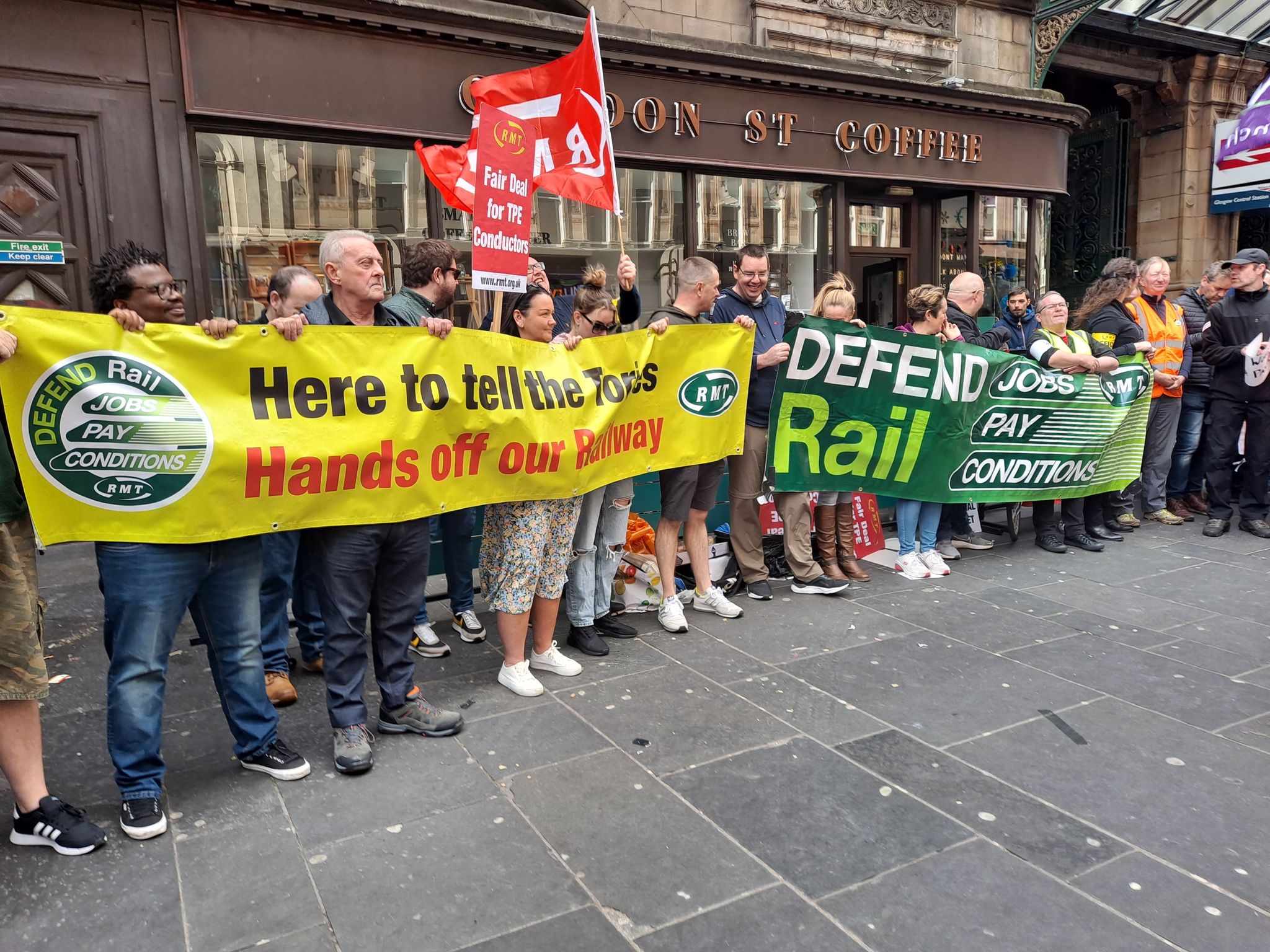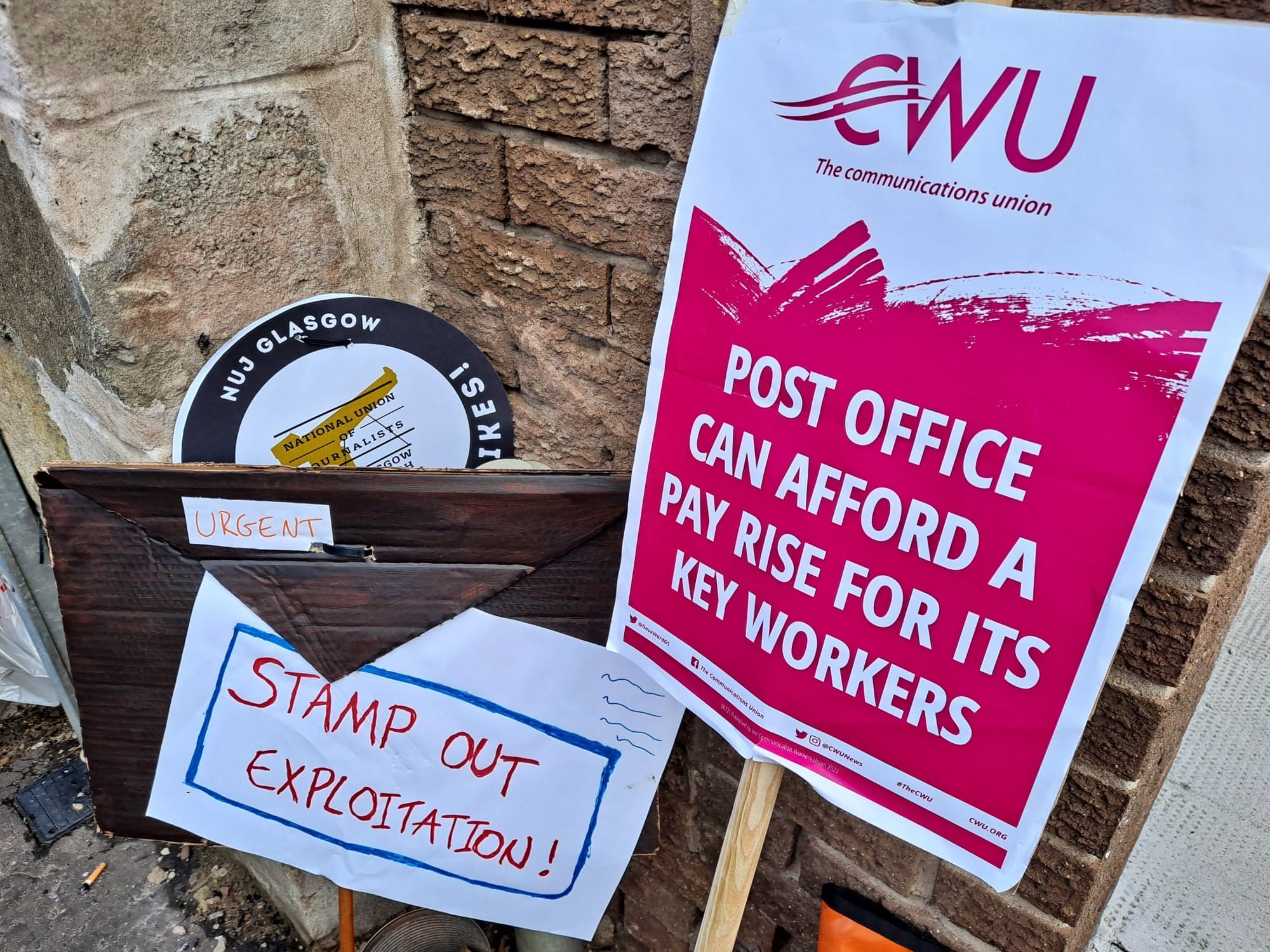Strikes - workers take on bosses and the Tories
Lisette Neill looks at the rapidly developing action
“The working class is back and we refuse to be poor any more” - Mick Lynch, RMT General Secretary, speaking this summer on behalf of growing numbers of super-exploited workers threatened with catastrophic real term pay cuts, and the possibility of destitution.
The National Union of Rail, Maritime & Transport Workers (RMT) members voted to strike in the face of a 3% offer after their demand for a 7% pay rise was rejected. In addition, Network Rail’s ‘modernisation programme’ threatened to cut safety-critical jobs such as train guards as well as ticket office staff and others, and to increase working hours. A series of one-day rail strikes since June has involved around 40,000 rail workers from Network Rail and 13 train operators, and they were joined by London Underground staff who staged a 24-hour strike on 21 June.
Over 115,000 Royal Mail postal delivery workers, members of the Communication Workers Union (CWU), have embarked on a series of strikes alongside CWU members in Post Offices and 40,000 BT/Openreach. Workers in the Post Office and Royal Mail were initially offered 3%, increased to a still unacceptable 5%. Royal Mail managers belonging to Unite the Union also voted to take industrial action in a dispute over redundancies and a redeployment programme bringing worsened terms and conditions; the vote for strike action was 86% in the UK mainland and 89% in Northern Ireland.
It looks likely that strike action will escalate later in the year with further major national disputes in the offing. Staff across the Health Service, including nurses and doctors, are set to be balloted for industrial action as are education workers, including teachers and university lecturers.
WORKERS EMBOLDENED
The high profile and general approval ratings for these industrial disputes have emboldened other groups of workers to take a stand against low pay and poor working conditions, in some cases for the first time. And it is private sector workers, together with trades unions such as GMB and Unite, who have achieved some of the best pay victories.
The Office for National Statistics reports that median wage increases are running at about 6.54% a year, but only at 1.3% a year for the lowest paid 3 million workers – with inflation running at 10.1% and forecast to hit 18.6% in January, according to a report by Citi based on latest market prices. (FT 22/8/22).
John Hendy QC, of the Institute of Employment Rights, has said there is “A transfer of wealth from labour to capital…unparalleled since the 1930s” (Morning Star 19/8/22). “The upsurge in industrial action has been compared to the 1970s,” Hendy writes, “but circumstances are very different… The 1970s was the most equal decade in British history. Wages took a greater share of GDP than ever before or since. That achievement was because 85% of workers had their terms and conditions set by collective bargaining between unions and employers. Successive governments have demolished collective bargaining in all but a few sectors … (and this) was achieved by legal restraints on industrial action, most particularly the outlawing of sympathetic industrial action.”
GIG ECONOMY
One relatively new development is the growth of the gig economy and businesses such as Uber and Deliveroo, where technology is used to directly match the buyers and sellers of goods and services. Many private sector companies as well as public sector organisations such as the NHS and universities have outsourced some of their work to agencies, and these workers often have precarious work resembling that of the gig economy. Some 3.5 million UK workers are identified as self-employed, including many of those working in construction, the arts, film and TV, music, sports, restaurants and hotels. They have no protection against unfair dismissal, no right to redundancy payments, nor have they the right to receive the national minimum wage, paid holidays or sick leave. Employers also benefit from the fact that they only pay when work is available, so don’t incur staff costs when work is not there.
There have been a number of legal cases which have led to attempts to more clearly define worker status in law. For example, Pimlico Plumbers lost its appeal in 2017 against a ruling that said one of its long-serving plumbers was a worker, and therefore entitled to basic rights, rather than an independent contractor.
While Uber’s CEO earned a reported £45 million this year, drivers’ wages have barely changed, while they face fuel inflation of 44% per year and a rise in vehicle costs of 28% on last year - costs that have to be met by the drivers themselves. There have been a series of strikes around the country by drivers represented by the App Drivers & Couriers Union (ADCU), Independent Workers of Great Britain and the GMB. Following a UK Supreme Court ruling of February 2021, Uber and the GMB came to an agreement whereby the union will be able to represent 70,000 Uber drivers, and which consequently guarantees them the national living wage (although drivers can and do earn more), holiday pay and a pension plan. Uber is now attempting to circumvent the Supreme Court ruling, and the ADCU is challenging them in court. Meanwhile the GMB has submitted a Collective Bargaining Schedule to Uber and, if agreement is not reached after negotiation, members will be balloted over whether to take further industrial action.
MORE STRIKES
The GMB and Unite are key unions defending workers‘ rights at the present time, especially workers in smaller workplaces with no track record of industrial action. For example, Budweiser workers in Samlesbury, Lancashire went on strike for the first time ever this summer, with 75% support from the 275-strong workforce. 93% of GMB members voted to reject the pay offer, citing the cost of living crisis and big bonuses paid to managers: “The economy is tanking, and inflation getting worse. So while (management) is telling us to go back to the shop floor and recommend the 3% rise, we can’t do that”.
The GMB has begun to make inroads at Amazon, where unofficial action began this summer at Tilbury following an “insulting” and “inadequate” 35p an hour pay rise offer. Wildcat strikes and canteen sit-ins spread to sites including Bristol, Coventry, Doncaster, Rugby and Rugeley, perhaps partly inspired by the notable, ground-breaking victories achieved by the Amazon Labor Union in the US. In Coventry, 70% of workers took part in a mass walk-out. While the GMB was not involved in the unofficial strikes, it has seen a significant increase in union membership, with some staff becoming union reps. Amazon has always been very sensitive to the suggestion of unionisation, and has refused to allow GMB reps near its sites to distribute leaflets. Workers who question employment practices at Amazon are threatened with a black mark, or ‘adapts’ as they are known, which last 6 months and can lead to dismissal. Amazon’s online sales model made it one of the major beneficiaries of the pandemic, with annual revenue soaring to £386 billion in 2020. Sales in the UK alone jumped by 51% in that year. Amazon UK Services reportedly paid no corporation tax in 2021, while stories emerged of workers unable to take toilet breaks and being pushed to reach unrealistic targets. The GMB is calling for a £15 per hour pay rate, and will ballot its members if this is rejected.
Unite has also supported workers in struggle in a wide range of industries this summer, from bus drivers, nurses and junior doctors to airport staff and Co-op coffin makers. Some notable successes include the 11.1% pay rise achieved by Arriva bus drivers in Merseyside, following 30 days of strike action during July and August. An industrial dispute by British Airways staff in July was suspended after the company made “a vastly improved pay offer” of a 13% average pay rise, while bus drivers at Gatwick Airport secured a 21.5% pay increase backdated to April, with overtime to be paid at time and a quarter.
Unions at twenty-six Scottish councils rejected a 2% pay offer and voted for industrial action, in an ongoing dispute which led to overflowing rubbish bins in the streets during the Edinburgh Festival. More than half of Scotland’s 250,000 council workers earn less than £25,000 for a 37 hour week.
In another show of strength for Unite, workers in DHL Services at Northern Ireland’s Spirit Aerosystems, which manufactures parts for aircraft, voted with an 84% majority for strike action, rejecting an insulting 4% pay offer. Meanwhile, 1,900 container port workers at Felixstowe, including crane drivers, machine operators and stevedores voted more than 9-1 in favour of a strike in August – the first to hit the port since 1989.
On 28 June, at the AGM of the British Medical Association, GPs voted to take industrial action over new contracts requiring them to work on weekday evenings and Saturdays.
The Criminal Bar Association (CBA) recently voted for continued strike action, with no resolution having yet been reached in their pay dispute. The CBA says some junior barristers currently make less than the hourly minimum wage, while long-term cuts to legal aid have caused a backlog of 58,000 cases. National Union of Journalists members voted to strike in September, following an unsatisfactory pay offer to journalists working for Reach group newspapers, including the Daily Mirror, Daily Express and other smaller titles. A major bone of contention was the £4 million pay package given to Reach chief executive, Jim Mullen, this year.
University and College Union (UCU) members at the Open University secured a huge win in August, with 4,800 staff taken off fixed term and onto permanent contracts. The UCU is to launch a national ballot for strike action in September over pay, working conditions and pensions. The Bakers, Food and Allied Workers Union – a small union of around 20,000 members – achieved successes this year in disputes with McDonalds, Wetherspoons and TGI Fridays. Exam markers at AQA, organised by Unison, have been on strike over pitifully low pay, which aimed to delay exam results and hit the universities’ admissions system.
Hundreds of workers have been involved in so-called wildcat, or unofficial strikes over pay and conditions, including contractors at the Grangemouth petrochemicals giant, INEOS. Under an existing agreement with their employer, the contractors were set for a 2.5% pay rise this year and next, which would leave them suffering a 10% real-terms cut. Walkouts of a similar size were also seen in Teesside, the Humber refinery in North Lincs, and the Valero refinery in Milford Haven.
AND MORE STRIKES TO COME
With the value of UK pay packets dwindling by the month, industrial disputes and strikes will only continue while employers offer below inflation pay rises and worsened conditions of employment.
This summer’s strikes and pickets organised by the RMT, which has 83,000 members and growing, have attracted much solidarity and support, despite counterattacks by the Tory government and media. As general secretary, Mick Lynch, said:
“What you are going to get is a wave of solidarity action, generalised strike action, synchronised action. And you’ll see it in every sector of the economy, in education, in health, wider parts of the transport system, the private sector as well. People are fed up with the way they’ve been treated. The British worker is basically underpaid and gets no dignity or respect in the workplace. We’ve got to change that so we get a square deal for everyone in Britain, and that’s what the unions are determined to do”.

RMT picket line at Glasgow Central Station







